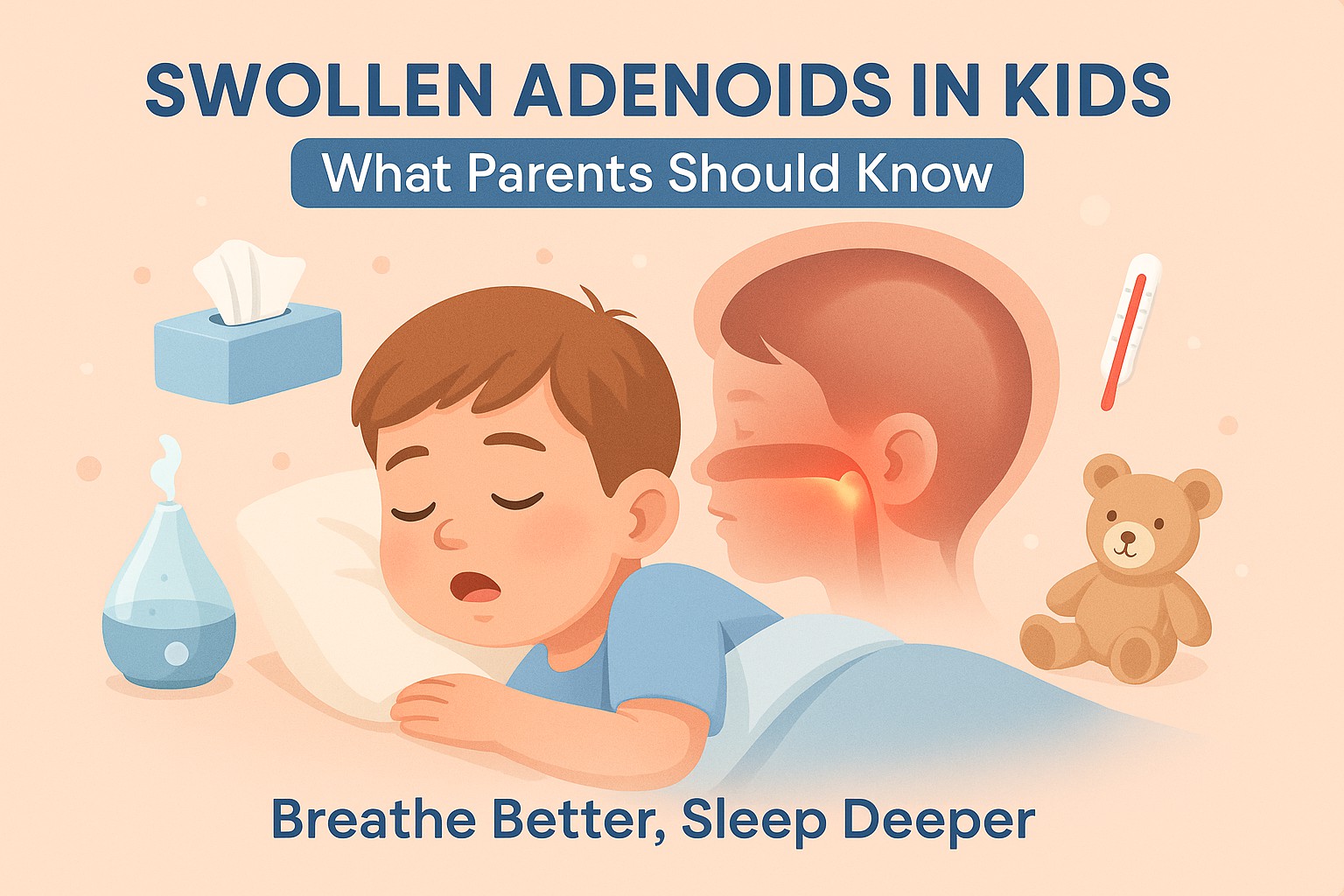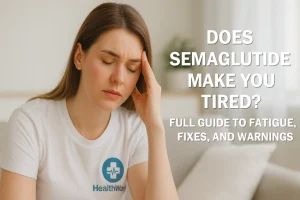Adenoids are small glands behind the nose. They help block germs, especially in young children. Most people never think about them. That changes when problems begin.
Swollen adenoids can block the nose. They may trap mucus or lead to ear pain. Breathing may feel harder. Sleep may break up during the night. These problems often start in childhood but can affect adults too.
Many parents notice the signs first. Their child snores, breathes through the mouth, or gets sick again and again. Adults may feel pressure or lose sleep but blame other causes. Waiting too long can make things worse.
This guide explains what causes adenoidid trouble. It lists clear signs and offers simple steps to find relief. Learn what to do and when to get help.
What Are Adenoids?
Adenoids are small glands behind the nose. They sit high in the throat, just above the mouth. These glands help block germs before they spread through the body.
In young children, adenoids play a strong role in fighting infection. They trap harmful bacteria and viruses. This protects the body in the early years. As children grow, their immune system gets stronger. The adenoids start to shrink. Most adults no longer need them.
You cannot see adenoidid in a mirror. A doctor checks them with special tools. These may include a small camera or mirror placed inside the nose.
Swollen adenoids can block the nose. They may also trap mucus. This can cause a stuffy nose, sore throat, or ear pressure. These problems often affect children, but adults may have them too.
What Causes Adenoid Problems?
Several things can make adenoids swell or hurt. Common causes include:
- Colds or throat infections
- Allergies that inflame the tissue
- Sinus problems
- Germs from bacteria or viruses
- Smoke or dirty air
Sometimes adenoidid stay large after an illness. They do not shrink back. The tissue stays swollen. That may block airflow or trap fluid. People may snore, breathe through the mouth, or feel ear pressure.
In adults, adenoid trouble may come from infection or sinus problems. These cases are rare but real. Some adults had surgery as kids and no longer have adenoids. Others may still face these issues.
Signs of Adenoid Problems in Children
Children show clear signs when adenoids swell. Symptoms often include:
- Trouble breathing through the nose
- Loud snoring at night
- Mouth breathing
- Many ear infections
- A nasal voice
- Poor sleep or breathing pauses
Some children wake up tired or feel cranky. Poor sleep can hurt mood, focus, and schoolwork. A child who gets sick often may have large adenoids.
Parents may think it is just a cold or allergy. If signs last over ten days or return often, adenoidid may be the cause. A doctor can check with a simple exam.
Signs of Adenoid Problems in Adults
Adults may also feel adenoid problems, though not as often. Symptoms may include:
- A blocked nose
- Mouth breathing during sleep
- Snoring or sleep apnea
- Frequent sore throats
- Ear pressure or fullness
These signs may look like other issues. Sinus problems or allergies may also cause them. A medical checkup can help find the true cause.
Adults often overlook adenoids. They blame other health issues. Delay can lead to poor sleep or more infections.
Diagnosis and Testing
Doctors use a few steps to find adenoid problems. They start by asking about symptoms. Then they look inside the nose and throat.
A small camera may help. This tool is called an endoscope. It shows if the adenoids are swollen or blocked. Some cases may need an X-ray or CT scan. These give a better view of the area.
If infections happen often, the doctor may suggest more tests. A hearing test checks if fluid is in the ears. An allergy test checks if a reaction is causing the problem.
Once the doctor sees what’s wrong, they explain the results. Then they help choose the right treatment.
If symptoms last more than a week, it’s time to see a doctor through Doctiplus and get the right care.
Treatment Options
The treatment depends on the cause and how bad the problem is. If a cold causes the swelling, rest and fluids may help. Other cases need medical care.
Doctors may recommend:
- Antibiotics to fight infection
- Nasal sprays to ease blocked airways
- Allergy medicine to control symptoms
- Surgery to take out the adenoids
Children who get infections often or struggle to breathe may need surgery. This procedure is called an adenoidectomy. It is safe and quick. Most children recover within a few days.
Some adults may need surgery too. This depends on how large the adenoidids are and their overall health. The doctor will explain the best option after checking the results.
Home Relief Tips
Simple steps at home can make a difference. These do not cure the problem but may ease symptoms for a short time. Clean air helps. Dust, smoke, and stale air can make things worse. Open windows when you can and let fresh air flow through the rooms.
Dry air can lead to more trouble. It may irritate the nose and throat. A humidifier adds moisture and helps with breathing. It keeps the airways from drying out and may reduce pain.
Strong smells often trigger more swelling. Smoke, perfumes, and cleaning sprays can upset the nose. Avoid them when possible. Saline spray may clear the nose and keep it moist and soft.
Rest also matters. A tired body does not heal well. Children need deep, full sleep each night. Sleep helps the body fight illness and lowers swelling.
These steps do not replace medical care, but they support comfort and healing. They may help stop the problem from getting worse.
When to See a Doctor
See a doctor if symptoms last more than a week or return often. Signs like blocked breathing, snoring, or many ear infections need care. Waiting too long may cause more health trouble.
Loud snoring or breathing stops during sleep may point to sleep apnea. That needs quick help. Adults with sore throats or sinus pressure should also see a doctor.
Doctors can treat the issue early. That leads to faster relief and better health.
Final Word’s
Adenoid problems can affect kids and adults. These issues often start small. Without care, they may grow worse. Signs like snoring, ear pain, or mouth breathing may point to the cause.
Infections, allergies, and smoke often lead to swollen adenoids. Treatment may include rest, medicine, or surgery. Most people feel better once the right care begins.
Do not wait if the signs return often. A quick doctor visit can help. Clear airways and better sleep may be just one step away.
Answers to What Most People Ask
What are the signs of swollen adenoids in children?
A child may snore during sleep, speak with a blocked-sounding voice, or breathe mostly through the mouth. Some wake up tired or get sick more often than usual.
Can adults have adenoid problems too?
Adults can have swollen adenoids, but it happens less often. Signs may include a stuffy nose, sore throat, snoring, or pressure in the ears.
How does a doctor check adenoids?
A doctor may use a mirror or a thin camera to view the inside of the nose. Some cases may need an X-ray or scan for a clearer picture.
When should adenoids be removed?
Surgery may help if breathing stays blocked, infections return often, or sleep remains poor. A doctor will check all symptoms before choosing this step.
Can swollen adenoids go away without medicine?
Swelling from a cold or allergy may go down over time. If it does not, or keeps coming back, a doctor should check for other causes.
Do home remedies cure adenoid problems?
Home care may bring short relief but does not solve the main issue. Medical help is often needed if symptoms do not improve.
Home care may ease symptoms, but it does not cure the main issue. Always watch out for health risks tied to unverified remedies that may delay real treatment.
Disclaimer: This article is for informational purposes only and does not offer medical advice. Please consult a licensed healthcare provider for diagnosis or treatment.




